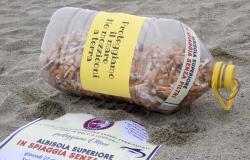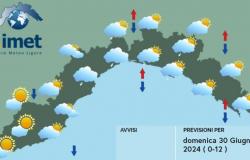2
The employment status of graduates from the University of Udine is confirmed to be significantly higher than the national average, with salaries also higher than the general figure. This is what emerges from the XXVI Almalaurea Report (https://www.almalaurea.it/) which involved 78 universities, the educational profile of approximately 300 thousand graduates and the employment status of approximately 660 thousand graduates.
Three-year graduates
One year after obtaining the qualification, three-year graduates have an employment rate of 80.1%, compared to the national 74.1%. The average net monthly salary is 1,406 euros compared to the general average of 1,384 euros.
Master’s graduates
The performances of second level graduates are also higher than the national average: master’s and single-cycle graduates. One year after the title, again in 2022, 83.3% are employed compared to the national 75.7 with an average net monthly salary of 1,508 euros, while the national average is 1,432 euros.
Five years after graduation the employment rate is 92.2% compared to the general 88.2% and the average net monthly salary is 1,806 euros compared to 1,768 euros at a national level.
Internships and level of satisfaction
More generally, graduates from the University of Friuli are more engaged in internships than the national average, 65.5% compared to 60.7%.
Regarding the degree of satisfaction, it is 91% for the university experience as a whole, 90% for relationships with teachers and 90.4% for the adequacy of the classrooms.
Placements: data processing done by the University of Udine
Five years after graduation, master’s and single-cycle master’s graduates have an employment rate that places them in 7th place nationally. Furthermore, they are in 6th place for the average time to enter the job market: 3.4 months compared to 4.9 at a national level.
Single-cycle master’s graduates one year after graduation are in 9th place for employment. There is also a 4th place for the average time to enter the job market: 3.1 months compared to 4.5 nationally.
«This year too the Almalaurea data are very positive for our University – underlines the rector Roberto Pinton –. They confirm and strengthen the considerable attractiveness of the world of work for all our graduates. And this thanks to a constant and multi-year commitment to guarantee our students quality study courses, a competitive research activity also at an international level, adequate services always ready to grasp new emerging needs, and structures, such as classrooms, laboratories , libraries, study rooms, living spaces, essential to allow our young people to give their best during their university career. A fundamental part of this framework is the very strong and widespread connection activity with the corporate and professional realities to facilitate meetings with our graduates”.
The University of Udine, underlined the University delegate for placement and relations with companies, Marco Sartor, «offers its students and graduates unique employment support services at a national level. Among these, the “Ad Personam” service, which provides individual outgoing orientation meetings, small departmental job fairs, “Placement Wednesdays”, and large generalist events, the “Job Breakfast” and the University Job Fair. Association of graduates in management engineering. We also offer – highlights the professor Sartor – a continuous matching service between job supply and demand and company visits aimed at placement, called “Career Tours”. This rich and varied set of services, developed over the years also thanks to the precious contribution of the Friuli Foundation, is helping to determine these excellent employment results.”
THE EMPLOYMENT CONDITION
The survey on the employment status involved 4899 graduates of the Friulian University, of which 1,796 three-year graduates, 1031 master’s graduates one year after graduation (756 two-year master’s degrees, 275 single-cycle master’s degrees) and 977 five-year graduates (721 two-year master’s degrees, 249 master’s degrees single cycle). Anyone who is engaged in a paid, work or training activity is considered employed. Performance was studied one year after the qualification, obtained in 2022, and five, in 2018.
Three-year graduates
The employment performances recorded refer to three-year graduates who have chosen to enter the job market directly, 42.4%. 56.2% instead decided to continue their studies. Among employed people, one year after their three-year degree, 17.9% continued with the job they had previously started, 17.7% changed jobs and 64.3% started working after obtaining their degree. 38% of employed people have a permanent contract, 29.5% have a fixed-term contract. 7.7% carry out their own business as a freelancer, entrepreneur, etc. Part-time work concerns 14.5% of employed people. The salary is on average 1,406 euros net per month. Regarding the effectiveness of the title, 59.3% consider it very effective or effective for the work performed.
Master’s graduates one year after graduation
One year after the master’s degree and single-cycle master’s degree, 19.8% continue the job they started before obtaining the qualification, while 21.1% have changed jobs; 59% started working only after graduation. 24.5% of employed people have a permanent contract, 31.6% have a fixed-term contract. 7.6% carry out their own business as a freelancer, entrepreneur, etc. Part-time work involves 10% of those employed. The salary is on average 1,508 euros net per month (1,482 euros for two-year master’s degrees and 1,586 euros for single-cycle master’s degrees). 69.6% of employed people consider the degree obtained to be very effective or effective for the job they are doing (61.7% of two-year master’s degrees and 93% of single-cycle master’s degrees).
Master’s graduates five years after graduation
Five years after graduation, 56.5% of master’s and single-cycle master’s graduates are employed on a permanent basis, while 15.7% are those on fixed-term contracts. 12.8% run their own business. Part-time work involves 4.2% of employed people. Salaries reach an average of 1,806 euros net per month (1,795 for two-year master’s degrees and 1,845 for single-cycle master’s degrees). 76% of employed people consider the degree obtained to be very effective or effective for the work performed (69.1% among two-year master’s degrees and 92.5% among single-cycle master’s degrees). As regards the employment sectors, 59.5% work in the private sector, 39.2% in the public sector and 1.3% in the non-profit sector. In particular, services absorb 72.7% of graduates, industry 24%, agriculture 2.7%.
THE PROFILE OF THE GRADUATES
The 2023 graduates of the University of Udine involved in Graduate profile report there are 2,968, of which 1,934 three-year courses, 778 two-year master’s courses and 256 single-cycle courses.
Citizenship, origin, education
Graduates with foreign citizenship are 2.6%: 2.5% among three-year graduates and 3.9% among two-year master’s graduates. 26% of graduates come from outside the region; in particular it is 22.7% among three-year courses and 33.8% among two-year master’s courses. 56.8% of graduates have a high school diploma: 51.8% for three-year graduates and 58.9% for two-year master’s degrees. 36.6% of graduates have a technical diploma: 40.3% for three-year graduates and 35.7% for two-year master’s degrees. The remaining share of graduates has a professional or foreign diploma.
Successful in university studies
Overall, graduates have an average age of 25.7 years. It is 24.8 for three-year graduates and 27.5 years for two-year master’s degrees. The data is affected by the delay in enrolling in university: not all graduates, in fact, enroll immediately after obtaining their qualification. 64.5% of graduates complete their current studies: 62.3% among three-year graduates and 68.5% among two-year master’s degree holders. The average degree grade is 102.5 out of 110: 99.9 for three-year graduates and 107.6 for two-year master’s degrees.
Internships, experiences abroad, work during studies
65.5% of graduates carried out internships recognized by their course of study. Specifically, 67.7% among three-year graduates and 62.2% among two-year master’s graduates (this value increases to 82.2% also considering those who completed it only in the three-year period). 8.5% have completed study experience abroad recognized by the degree course (primarily Erasmus). Of these: 6.5% are three-year graduates and 12.6% are two-year master’s graduates (the latter share rises to 18.9% also considering those who completed them only in the three-year period). 70% of graduates carried out a job during their studies: 69.1% among three-year graduates and 70.9% among two-year master’s degree holders.






